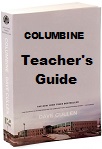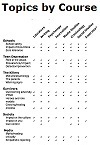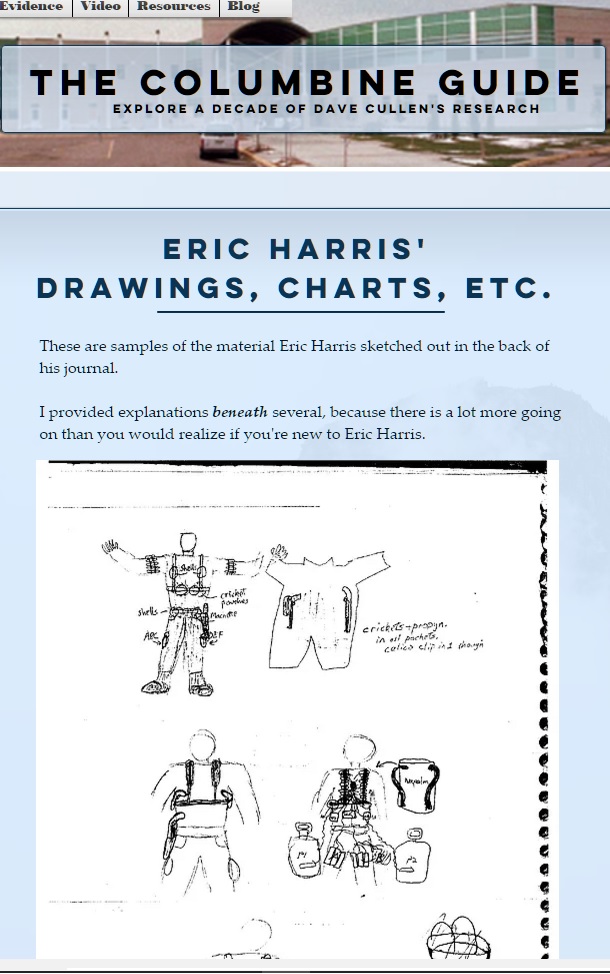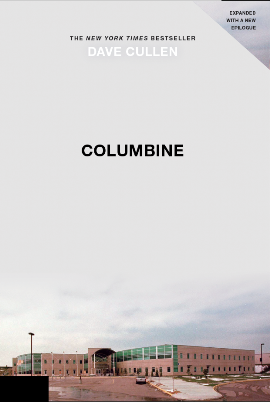Literature
See the Questions section for a wide variety of additional questions about the content, social impact, etc. (This section is strictly focused on literary elements.)
See the Creative Writing section for writing exercises addressing each of these literary elements.
Character
-
Provide a brief character sketch of each killer. Were they more similar or different? What drew them together?
-
Compare In Cold Blood 's Dick and Perry to Columbine's Eric and Dylan. What similarities and differences do you find? How did Capote and Cullen's approaches to researching and telling their stories differ?
-
The book cites two literary characters as perfect psychopaths: Iago from Othello, and the narrator of Notes from Underground. Both were invented before the diagnosis even existed. How did Shakespeare and Dostoevsky understand the phenomenon long before modern science? What other writers and artists have a keen eye for the human condition. Discuss how novelists and playwrights can help humans understand ourselves better.
-
Can you identify other fictional psychopaths in literature? How about angry depressives? (Not just “sad” characters, but clinical depression.)
-
(See the cross-curricula module for several more discussion questions on character, under the sections on the killers and survivors.)
Plot &Structure
-
How does the author build and maintain suspense and mystery in the book? How does he deal with the fact that readers may know—or think they know—the outcomes or details of the book's events?
-
Identify at least nine major storylines this book contained. How easy was it to recall each story/character with so many intervening? What devices allowed you to remember them and helped you stay interested?
-
At what point in the book did you decide if you liked it or not? What helped you make this decision?
-
As you read the book, what surprises did you encounter? Why do you think you hadn't known about them before?
-
This book has a highly complex structure. Was it effective? Outline the primary structure of the book, and the use of additional techniques such as flashbacks within that framework.
-
How many times does the reader encounter murder over the course of the book? How long does each episode last and how far apart are they spaced? What is unique about each episode? Why did the author make these choices? How effective were they?
-
At what point in the narrative could one decision or one action have changed the outcome? Which characters had a chance to make a difference but didn't?
Tone & Voice
-
How does the author vary content and tone to affect the mood: eg, tragic passages intercut with hopeful scenes, or murder with redemption? Select a passage of 20 pages and identify each shift in mood. How does this affect the reading experience?
-
The narrator of this book has been described as speaking “quietly.” Do you agree or disagree. Cite a passage and explain how the voice is understated or hyped.
-
Was the narrator generally objective or judgmental? What sort of attitude did he convey toward his characters? Did he respect them? How can you tell?
Form/Technique
-
Some readers have referred to Columbine as a "non-fiction novel." Do you think this description fits? What other books fall into this category? How does Columbine use the form differently? How well does it fare?
-
Was irony employed in the book?
-
How did the author use language or imagery to enhance the story or create the mood? Did it feel like you were in the presence of teenagers even when dialogue was not present? How was that achieved?
-
Cullen has been both praised and criticized for his use of very short sentences. How did you respond to this rhythmic variation? Was it effective? Compare his sentence rhythms to one other author you strongly like or dislike.
-
Were metaphors or other tropes used? What other literary devices were employed?
-
How heavily is dialogue used? Is it effective?
-
Where did the author get this dialogue? Does he explain his process and his choices? Do you agree with them?
-
The endnotes of the book provide a sort of story behind the story. How interesting did you find the backstory? Was it wise to sequester it from the main narrative?
Setting
-
What was unusual about the setting of the book? Did it enhance the story?
-
Reporters routinely described the Columbine area (Jeffco) as a typical American suburb, like any other. Did it come across that way in the book? What distinguished it? How did the author make it feel like a very specific place? Did the particularity influence your feelings toward the story?
-
Discuss how novelists use setting to establish authenticity, versus common journalistic technique.
-
How do Columbine High School and the community of Littleton compare with your own school and community? How likely is it that a similar event could happen where you are?
Theme
-
What are the primary themes of this book?
-
How was good vs. evil portrayed? Was the concept prominent in the thinking of Eric? Dylan? The victims and survivors?
-
How did religion impact the story?
-
How inevitable was the attack? Should anyone have stopped it? Who?
-
Were the survivors powerless? Which ones took control of their own destinies? What made the difference between them and those who remained victims?
-
Who chose to “forgive?” How did it work out for them? Why do some survivors embrace that word and others reject it?




